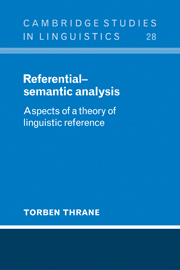2 - THE PHILOSOPHICAL PRELIMINARIES
Published online by Cambridge University Press: 06 August 2010
Summary
Introductory comments on ‘meaning’
It is the ultimate task of semantics to describe the meaning of the words, phrases and sentences in particular languages and in language generally. This ultimate goal can only be achieved through the achievement of various intermediate goals: (a) a definition or explanation of the term ‘meaning’; (b) the development of a notational system in which meanings may be articulated; and (c) the development of a system of general rules matching the meanings of given words, phrases and sentences with particular notational specifications. The achievement of these intermediate tasks would enable us to fill in statements of the following form: (a) ‘meaning is __’, or ‘meanings are __’; (b) ‘the notational specification x is a specification (representation) of a meaning’; and (c) ‘the notational specification x is a specification (representation) of the meaning of y, because __’. The issues relating to (a) will be considered under the general heading of different approaches to the notion of meaning, those pertaining to (b) under semantic representation, and those that come under (c) under the term semantic analysis.
Although many diverse answers have been given to the question ‘What is meaning?’ throughout the history of linguistics and philosophy (e.g. physical entities, modes of signifying, mental images, concepts, ideas, the uses of words, speaker's stimulus/hearer's response) it appears that only two answers need be taken seriously: (1) meaning is a set of conditions; and (2) meaning is a set of relations.
- Type
- Chapter
- Information
- Referential-Semantic AnalysisAspects of a Theory of Linguistic Reference, pp. 22 - 30Publisher: Cambridge University PressPrint publication year: 1980



